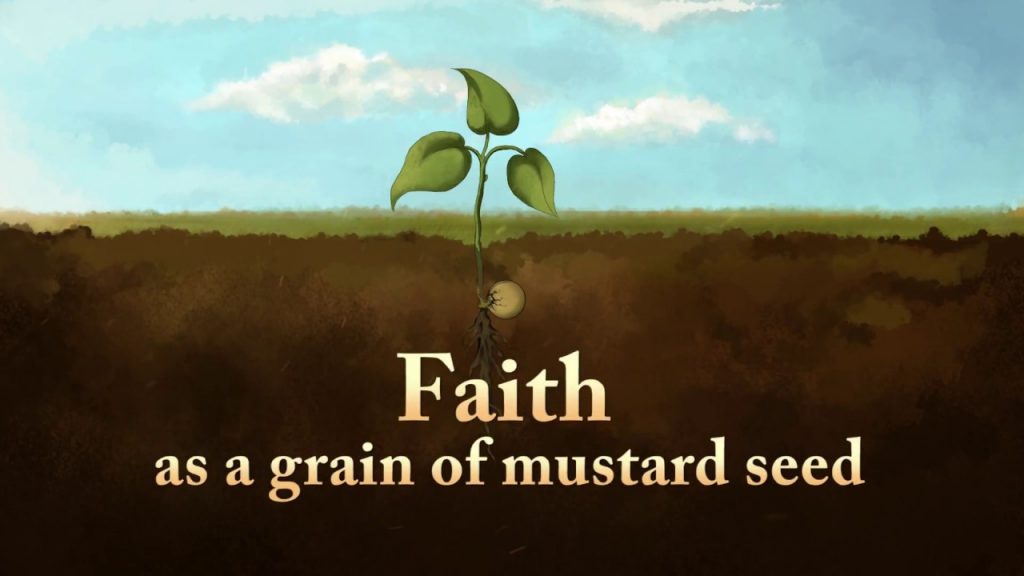27th Sunday in Ordinary Time, C

Hab 1:2-3; 2:2-4; 2 Tm 1:6-8, 13-14; Lk 17:5-10
The disciples saw how Jesus demanded from, and praised the faith of, those who asked for healing. When the apostles were now themselves commissioned by Jesus to proclaim the Gospel, they perceived the painful disproportion between the mission they received and the littleness of their own faith. Thus they cried out: “Lord, increase our faith.” They did not doubt that Jesus was the Christ; rather they lacked trust in God who performed miracles; they lacked the faith even “the size of the mustard seed.”
From the prophet Habakkuk we hear that “the just one, because of his faith, shall live.” St. Paul reminds Timothy “to stir into flame the gift of God,” which is “a spirit of power and love and self-control.” Faith is a gift from God and must be constantly stirred into flame by living out all its consequent virtues. This faith first of all is acceptance of everything contained in our Creed. This faith is also trust in God as our loving Father, Creator, Provider, Rock of refuge, Healer, a merciful and forgiving God. This faith is also expressed joyfully and enthusiastically in praise and thanksgiving, and through the charismatic gifts for the building up of the Church. Yes, Lord, increase our faith that it may not be confined only to our personal growth, but may also reach out to our brothers and sisters in the whole community of the universal Church.
The parable on the relationship of master and slave must be looked at in the context of the ancient idea of slavery. Modern ideas of the responsibility of employers to employees should not be read into it or allowed to confuse its understanding. Remember that slaves were bought and, therefore, owned by the master. Slaves had to carry out their duties without expecting that they thereby place their master under obligation of compensating them. For a slave, the performance of duty does not entitle one to a reward. The Pharisees had this mindset, that the performance of good works constituted a claim on God for due reward, a kind of quid pro quo. Among the Pharisees there was the prevailing trend of righteousness by works; they thought that service in the synagogue or the temple entitles them to some reward and that they can be proud of what they have done. The slave could not minister to his master for the sake of receiving a bounty; neither should a faithful Jew obey the Torah in order to claim merit for himself.
Humans cannot put God in their debt. What is wrong is the attitude that seeks reward and thinks that it can lay claim upon God. When disciples have accomplished all that God has commanded them, they have no claim upon him. Jesus had stressed the element of divine grace, that we have nothing that is not a gift, to which the appropriate human response is gratitude. The disciple is not to seek thanks, but to give thanks. We are thankful that we are allowed to be his servants, that we are given the grace to perform works of mercy, corporal and spiritual. The capacity to love and serve our parents and siblings is a grace. That we are able to be faithful to our spouse and preserve our family intact is a grace from God that today is not granted to many families. That we have the talents to succeed in business, or go up the ranks in the corporate world and thus provide more than enough for our families and still have time to serve in our parish or in charitable institutions is a special grace from God to be thankful for. The talent of teaching to prepare the children to be the professionals of the next generation is a grace from God we have to be thankful for. The talents of doctors, nurses and medical technicians who take care of our health and other medical needs are a gift from God our society must be thankful for. We can enumerate so many professions and functions in society that presuppose all the talents given by God and we cannot cover all of them to thank God for all the gifts and the gifted persons in our midst. “Hiram sa Diyos ang ating buhay. Kung buhay man ay hiram, ano pa ang hindi hiram?” Everything is a gift and the correct attitude in our hearts is only gratitude and praise for our great Father and Benefactor in heaven.
